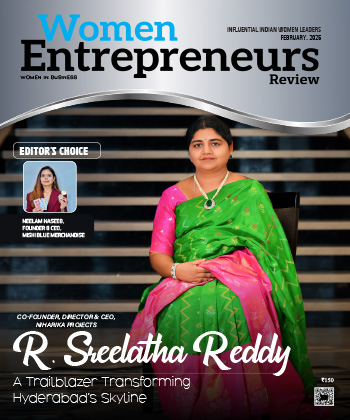
Study says Young Women Entrepreneurs in Karnataka lack Mentorship
By: WE Staff | Monday, 29 April 2024
A recent study by Edupull, an ed-tech startup found that young women in Karnataka feel neglected and lack mentorship, despite their passion for entrepreneurship. The survey, which included over 8,700 students that covered Tier-1 and Tier-2 cities of Karnataka including Bengaluru, Mangaluru, Belagavi, Mysuru, and Hubbali revealed that many are hesitant to venture into corporate and multinational companies.
The survey reveals that 66 per cent of Indian students have entrepreneurial role models, but a significant gender gap still exists, with nearly half of the women in Tier 1 cities with 46.4 per cent and Tier 2 cities with 42.44 per cent lacking mentors who can assist them in advancing their ideas and perspectives. There is an urgent need for mentorship programmes that will assist female entrepreneurs, says the survey titled "Exploring the Landscape of Indian Students and Entrepreneurship." Rohan Rai, co-founder of Edupull stated that the survey conducted in February 2024 revealed that despite a rise in young talent exploring entrepreneurship, there are still significant gaps persist. He mentioned, "The females in Tier 2 & 3 cities have limited educational options and accessibility, given the cultural backgrounds and societal influence. Universities and the government should address this and make appropriate policy changes. the first step could be replicating the IITs, IIMs, and IIITs model and building incubation and upskilling centers in smaller towns."
Around 25,000 or 23.91 per cent of respondents surveyed identified access to funding and capital as primary challenges, along with 19.57 per cent said building a strong team and attracting talent. Nearly two-thirds or 59.02 per cent believe the support system for entrepreneurs is weak and lacking. Rohan further noted that young people are hesitant to start businesses due to financial and infrastructure concerns, but are increasingly seeking to break free from traditional 9 to 5 work patterns.
Most Viewed
- 1 Women's Health Startup HerMD Closing Doors Amid Industry Challenges
- 2 5 Famous Women in Indian Armed Forces
- 3 Saudi Women No longer Require Male Permission for Clothing Choices, says Prince MbS
- 4 Kolkata Medtech Startup Innovodigm Raises Rs 5.5 Crore Seed Funding Led by IAN Group
- 5 Yamunanagar's Kashish Kalra Honoured after Securing 111th Rank in UPSC Civil Services Exam
- 6 Madurai Appoints Its First Woman Corporation Head
- 7 IAS Vijayalakshmi Bidari Appointed as the new Nagpur Divisional Commissioner
- 8 American Entrepreneur Lucy Guo Overtakes T Swift to become Youngest Female Billionaire
- 9 ICC Women's World Cup 2025 Trophy Showcased at Indore's Holkar Stadium
- 10 Aparna Saxena's Beauty Venture AntiNorm Launches in India
- 11 Vidya Nataraj Co-Founded BlueStone Jewellery & Lifestyle files IPO
- 12 5 Women Freedom Fighters of India
- 13 Dr. G Krishnapriya appointed as CEO for Trichy
- 14 M3M & Sirona Partner to Introduce Menstrual Hygiene Vending Machines in 15 Locations
- 15 Punjab Govt launches SHE Cohort 3.0 Supporting Tech-led Women Startups
- 16 Indian origin Lawyer, Sweena Pannu appointed as the US New Superior Court Judge
- 17 The Aurora Tech Award recognizes 4 Indian Women-led Startups
- 18 Kerala's Republic Day parade featured an all-female tableau
- 19 Manisha Kabbur Becomes Karnataka's First Woman International Karate Coach
- 20 Director K. S. Ravikumar's Daughter Maalica Ravikumar Launches Life Coaching Company 'Evergrowth Academy' for Women
- 21 Leezu's Raises Pre-Seed Funding to Accelerate Growth in Sexual Wellness Industry
- 22 Sattu: Super-easy summer drink for PCOS gut healing
- 23 Swathi Nelabhatla creates Sitha App, India's First Women-Exclusive Gig Platform
- 24 7 Timeless Female Kathak Dancers & their Iconic Legacies
- 25 Meet 7 Iconic Women Architects of Modern India & their Most Impactful Work
- 26 This Woman-led Insuretech Startup is Helping Bridge the Education Financing Gap in India
- 27 Women Leaders Share Lessons Learnt from India Women's WC Win
- 28 5 Enterprising Women Founders Powering Singapore's Tech & Innovation Landscape
- 29 4 Women. 4 Stories. One Vision for Smarter, Stronger Healthcare
- 30 Global Gender Gap Narrows to 68.8%, But Full Equality 123 Years Away: WEF Report 2025
- 31 Changemakers: 7 Women Entrepreneurs Taking the Make in India Movement Forward
- 32 Meet Lucy Guo, The Youngest Self-Made Female Billionaire Disrupting Tech
- 33 How Women are Driving India's Festive Online Shopping Surge






